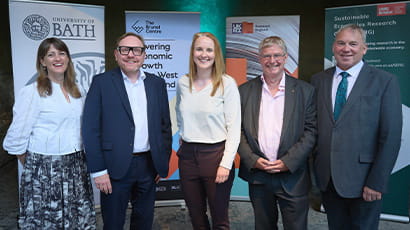UK's first study into driverless cars for older people comes to a close

Residents at a Bristol retirement village have participated in a demonstration to see how driverless vehicles, known as CAVs (connected and autonomous vehicles) could make a difference to their everyday lives.
On Tuesday 21 May an autonomous vehicle — a Pod Zero — was used by older people around the St Monica Trust's Cote Lane retirement village in the culmination of a world-leading research project.
The £5.5M project, known as Flourish, is run by a multi-sector consortium of organisations including the University of the West of England (UWE Bristol) and is the only Innovate UK funded project focused on older people. The project launched in 2016 with an aim to develop a driverless vehicle that integrates the mobility needs of older people with a secure and connected infrastructure.
The introduction of CAVs could revolutionise mobility for older people, reducing loneliness and helping them to maintain a healthy level of independence. It is anticipated the pods could be in operation on enclosed campuses like retirement villages within five to ten years.
The demonstration at the Trust's Cote Lane retirement village saw participants experience a journey in an Aurrigo Pod Zero, a first production line model of CAVs that are currently being trialled at a retirement village in Australia. Open to people aged 65 and over, the physical demonstration lasted around 10 minutes before attendees were invited to provide feedback on their experience. A safety 'driver' accompanied up to three participants at a time on a planned journey around the site.
Sara Naylor-Wild, director of development and research at St Monica Trust, commented: “We have a long-standing relationship with UWE Bristol, especially around technology and assisted living. At St Monica Trust we are constantly continuing to develop our thinking with what we can offer our residents to ensure they live their best lives.
“When we were given the opportunity to host this demonstration it was a no brainer for us, our residents are open to new technologies and they certainly rose to the challenge. The demonstration has been thrilling, it's such an exciting opportunity and the residents have met it with such enthusiasm.”
The Flourish project works across three specialist areas at UWE Bristol, which ran the event at the St Monica Trust village. These are the Bristol Robotics Laboratory, the Centre for Transport and Society and the Psychological Sciences Research Group. This group of specialists has helped the research project cover the science behind driverless vehicles, the UK's future transport requirements and the psychology behind how humans interact with and what they want from CAVs.
The project team decided to work with the St Monica Trust due to their like-minded dedication to introducing innovative technologies into their retirement villages that encourage and facilitate independence in later life.
Dr Chris Alford, Associate Professor in Applied Psychology at UWE Bristol, said: “The event was a perfect way to conclude the Flourish project - with a demonstration of how pods could be used to transport older people, and those with limited mobility, within their home environment.
“Our project team has been able to gather a high quantity of useful feedback from St Monica Trust residents, offering a valuable insight into how older people feel about the concept of driverless vehicles and the types of user interfaces that might work best for them.
“Flourish is unique in being focused on older people, who will be among the first to benefit from the private and community availability of driverless transport. The project has shown that driverless vehicles have the potential keep older people engaged in their communities and in touch with their family and friends.”
The design of the vehicles has been the result of a period of consultation with older people to identify what they want from driverless vehicles and their vision for future CAV use. The consultation process has included older people visiting a simulator in a robotics lab, real trials with a CAV, and various workshops and discussion groups.
The research to date, supported by Bristol City Council and South Gloucestershire Council, has found that older people have an acceptance of these vehicles and that they wish for the cars to become commonplace in order to have the freedom to plan days out, pick up grandchildren as well as run day-to-day errands.
The project has also considered the design of the cars to ensure they meet requirements. This has included studying how older people interact and operate the vehicles using a human machine interface (HMIs) and adapting them to allow for impaired vision, loss of hearing, restricted mobility, poor movement control and issues with balance and difficulties with speech, memory and attention.
Following the demonstration event, the team will publish a report this summer and develop a standardised assessment framework that will help determine the individualised adaptations needed for older people and people with disabilities to introduce these vehicles into their everyday lives.
Find more information on the Flourish project.
Related news

12 December 2025
UWE Bristol’s environmentally conscious and student-focused accommodation wins three awards
Purdown View, the world's largest certified Passivhaus student accommodation development, has been recognised at Property Week Student Accommodation Awards.

25 November 2025
Health-tech start up MyCelsius launches breakthrough cooling tech for hot flushes developed at UWE Bristol’s Launch Space
A pioneering Bristol-based health-tech company developing cutting-edge cooling technology for hot flushes has credited UWE Bristol’s Launch Space incubator with playing a key role in accelerating its product development.

14 November 2025
Lecturer wins prestigious Times Higher Education award for innovation in teaching
A senior paramedic science lecturer at UWE Bristol has been named the most innovative teacher of the year in the Times Higher Education Awards 2025.

13 November 2025
Alliance Medical and UWE Bristol launch UK’s first PET-CT postgraduate certificate
In a move set to transform imaging education, Alliance Medical (AML) and UWE Bristol have joined forces to co-design and develop the UK’s first PET-CT Postgraduate Certificate (PG Cert).

13 November 2025
New AI research to revolutionise animal welfare
A UWE Bristol research project will combine behavioural science and AI to create technology that understands not only what animals do, but how they feel.

29 October 2025
UWE Bristol academic unveils breakthrough in energy-efficient AI at NATO science forum
Dr Jonathan Lancelot has developed a new form of AI that could transform how intelligent machines operate in space, defence, and remote environments.

07 October 2025
Academic playing role in project to find hidden graves in Mexico using drone technology
A UWE Bristol lecturer is playing a part in a project using drone technology to locate concealed graves in Mexico.

01 October 2025
New funding for researchers to develop trustworthy clinical AI for assessing brain activity
Researchers have received funding from UK Research and Innovation to help bring their innovative brain-monitoring AI technology closer to real-world use.

11 September 2025
New study to investigate augmented reality as an intervention for emotionally based school avoidance
A UWE Bristol researcher will support a new study exploring whether an augmented reality board game can help young people with emotionally based school avoidance (EBSA).

22 August 2025
A decade of Future Space: How UWE Bristol’s enterprise zone is powering innovation and economic growth
Tracey John, Director of Research and External Engagement, reflects on the impact of Future Space and its role as a launchpad for cutting-edge companies shaping the future of how we live and work.

11 July 2025
Wound dressings developed with support from UWE Bristol to be launched by global firm
Technology that a team of UWE Bristol scientists helped develop to aid the healing of chronic wounds will be used in new ‘smart dressings’ being launched by global medical company.

03 July 2025
Research lab The Brunel Centre opens to power sustainable and inclusive growth for the West of England
A new data and research centre designed to support sustainable and inclusive growth and industrial strategy in the region, has officially launched.






